

Our-Discussion.jpg (Image JPEG, 719x935 pixels) LogicalFallaciesInfographic (1199x769) Reasoning Is Sharper in a Foreign Language. The language we use affects the decisions we make, according to a new study.
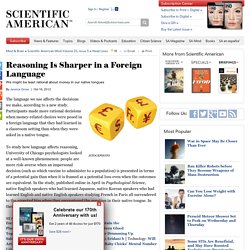
Participants made more rational decisions when money-related choices were posed in a foreign language that they had learned in a classroom setting than when they were asked in a native tongue. To study how language affects reasoning, University of Chicago psychologists looked at a well-known phenomenon: people are more risk-averse when an impersonal decision (such as which vaccine to administer to a population) is presented in terms of a potential gain than when it is framed as a potential loss even when the outcomes are equivalent. In the study, published online in April in Psychological Science, native English speakers who had learned Japanese, native Korean speakers who had learned English and native English speakers studying French in Paris all surrendered to the expected bias when they encountered the question in their native tongue. Word Dynamo - Free Study Guides, Quizzes, Games and Flashcards.
Other_Languages_b.png (3508×2480) Lexical Distance Among the Languages of Europe « Etymologikon™ Posted by Teresa Elms on 4 March 2008 This chart shows the lexical distance — that is, the degree of overall vocabulary divergence — among the major languages of Europe.
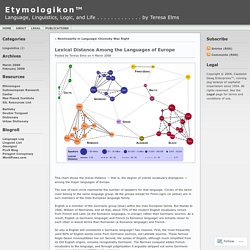
The size of each circle represents the number of speakers for that language. Circles of the same color belong to the same language group. All the groups except for Finno-Ugric (in yellow) are in turn members of the Indo-European language family. English is a member of the Germanic group (blue) within the Indo-European family. So why is English still considered a Germanic language? The original research data for the chart comes from K. Learn a language from life. Rimes : Dico - rimes : Dictionnaire pour trouver des rimes. Conseils aux écrivains en herbe, par Bernard Werber. Portal:Language. Learn a language from life.
STREMOR : natural language understanding through heuristics. PlexiNlP: web-scale natural language processing. Scop Le Pavé. Les mots du pouvoir. Portal:Constructed languages. Les mots du pouvoir (arT errOriste) La novlangue néolibérale “Prendre le train des réformes, Créer du lien social, définir de nouveaux projets de relance de la croissance en synergie avec les partenaires sociaux et en privilégiant le dialogue social aux blocages et aux prises en otages inacceptables de la part d'une frange toujours plus radicalisée de l'ultra gauche.”
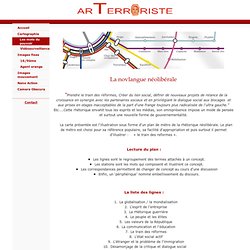
Etc....Cette rhétorique envahit tous les esprits et les médias, son omniprésence impose un mode de pensée et surtout une nouvelle forme de gouvernementalité. La carte présentée est l'illustration sous forme d'un plan de métro de la rhétorique néolibérale. Deb Roy: The birth of a word. Patricia Kuhl: The linguistic genius of babies. La question de la langue à l'époque de Google. English is no longer the language of the web. Conventional wisdom suggests that English is becoming “the world’s second language,” a lingua franca that many forward—looking organizations are adopting it as a working language.

Optimists about the spread of English as a global second language suggest it will enable collaboration and ease problem solving without threatening the survival of mother tongues. Pointing to hundreds of thousands of Chinese children who learn English by shouting phrases back at teachers, the American entrepreneur Jay Walker offers the idea that English will be a language of economic opportunity for most speakers: they’ll work and think in their mother tongue, but English will allow them to communicate, share, and transact. Cultural-preservation organizations like UNESCO aren’t as confident of this vision. Bluefin Labs. Twitter shows language evolves in cities - tech - 17 November 2012.
WHERE do new words come from?

On Twitter at least, they often begin life in cities with large African American populations before spreading more widely, according to a study of the language used on the social network. Jacob Eisenstein at the Georgia Institute of Technology in Atlanta and colleagues examined 30 million tweets sent from US locations between December 2009 and May 2011. Several new terms spread during this period, including "bruh", an alternative spelling of "bro" or "brother", which first arose in a few south-east cities before eventually hopping to parts of California. Residents of Cleveland, Ohio, were the first to use "ctfu", an abbreviation of "cracking the fuck up", usage that has since spread into Pennsylvania (arxiv.org/abs/1210.5268).
After collecting the data, the team built a mathematical model that captures the large-scale flow of new words between cities. About WordNet - WordNet - About WordNet. Learn English, Spanish and German for free. Duolingo: The next chapter in human computation: Luis von Ahn@TEDxCMU. Ensayos de Calidad, Tareas, Monografias, y Trabajos de Investigación Personalizados - BuenasTareas.com. 501 Spanish Verbs flashcards. WordNet. WordNet is a lexical database for the English language.[1] It groups English words into sets of synonyms called synsets, provides short, general definitions, and records the various semantic relations between these synonym sets.
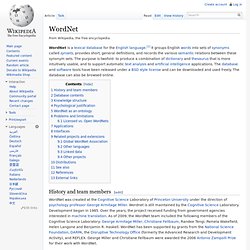
The purpose is twofold: to produce a combination of dictionary and thesaurus that is more intuitively usable, and to support automatic text analysis and artificial intelligence applications. The database and software tools have been released under a BSD style license and can be downloaded and used freely. The database can also be browsed online. Building an Archive of ALL Documented Human Languages. - The Rosetta Project. Technologies du Langage. Professional Translation Services - One Hour Translation - Translation Agency. Dictionnaires de Traduction. Dictionnaire chinois - francais en ligne. Wordsmith.org : The magic of words. word, language, quote, quotation, anagram, dictionary, words, languages, quotes, quotations, anagrams, dictionaries. Google Translate.
Featured Videos sub. PROMT - Free Online Translator and dictionary - English, German, French, Spanish, Italian, Portuguese (Brazilian) and Russian languages. Linguee – Le web est un dictionnaire – Français / Anglais. Foreign Language Vocabulary, Grammar, and Readings. MyMemory - Quand la traduction automatique rencontre la traduction humaine. French expressions you won't learn at school. Dictionary, Language learning, Translations - [deect] Learn & Practice English, French, Spanish and More with Partners Around the World.
Most Common Russian Words - Top 1000 Russian words. This page provides the frequency list of 1000 most common Russian words and their English translations.

Learning most used words early in your Russian study will have a significant impact on your mastery of the Russian language. According to statistical analysis of contemporary Russian texts, knowing the first thousand of most frequent lemmas will enable you to recognize nearly 65% of the Russian word forms. Top 50 Russian words 1 of 12 | < Prev Next > 1 of 12 | < Prev Next > Drmardy.com: A web site for lovers of wit and wordplay. Communication orale et interpersonnelle. Pygmalion communication, formation, conseil, accompagnement et coaching en communication. Prise de parole - Communication orale. Propensity to communicate surprise & emergence of language.pdf. La linguistique du Chaos. La linguistique du Chaos constitue l’annexe I, pp. 75-77, de T.A.Z.
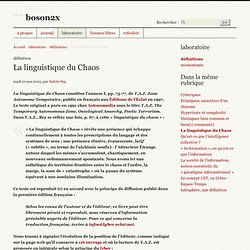
Zone Autonome Temporaire, publié en français aux Éditions de l’Éclat en 1997. Le texte original a paru en 1991 chez Autonomedia sous le titre T.A.Z. The Temporary Autonomous Zone. Ontological Anarchy, Poetic Terrorism. Dans T.A.Z., Bey se réfère une fois, p. 67, à cette « linguistique du chaos » : « La linguistique du Chaos » révèle une présence qui échappe continuellement à toutes les prescriptions du langage et des systèmes de sens ; une présence élusive, évanescente, latîf (« subtile », un terme de l’alchimie soufie) - l’Attracteur Étrange autour duquel les mèmes s’accumulent, chaotiquement, en nouveaux ordonnancement spontanés.
Ce texte est reproduit ici en accord avec le principe de diffusion publié dans la première édition française : Selon les voeux de l’auteur et de l’éditeur, ce livre peut être librement piraté et reproduit, sous réserves d’information préalable auprès de l’éditeur. La linguistique du Chaos. Latin proverbs and locutions.